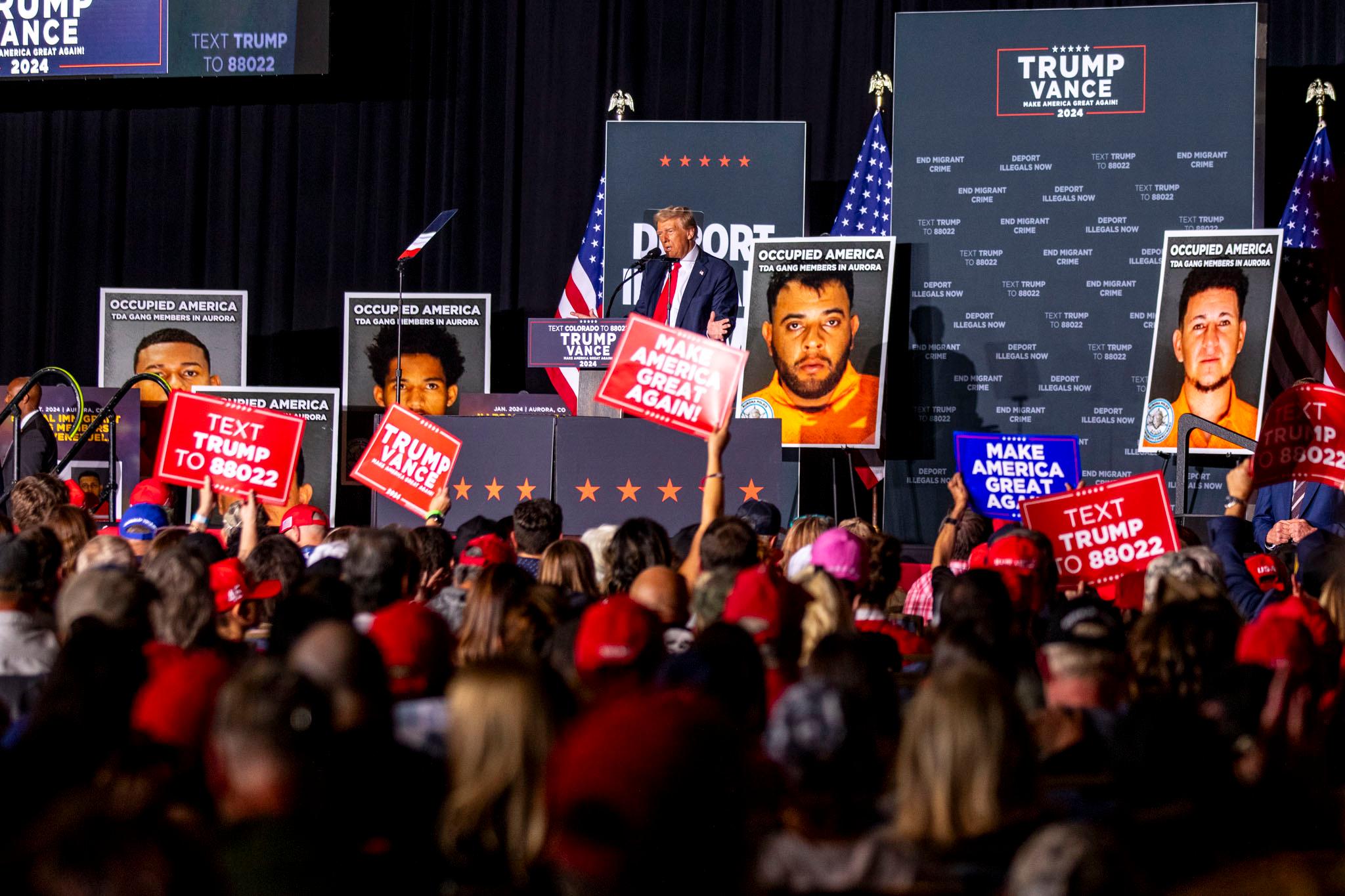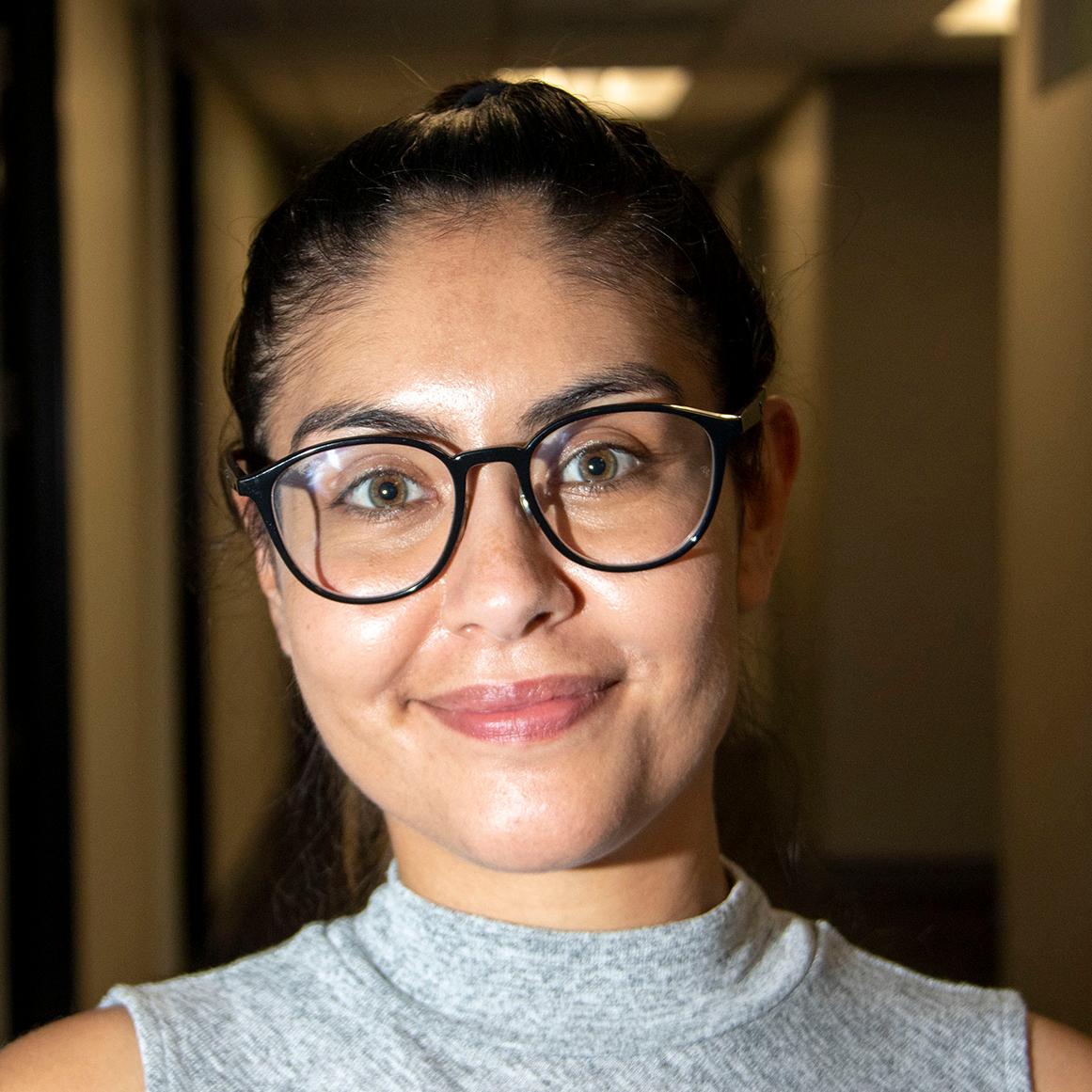Immigrant rights advocates, lawyers and their allies are preparing for President-elect Donald Trump to follow through on his promise to begin a nationwide plan for mass deportations in Colorado.
In an October rally, the president-elect called Aurora a “war zone.”
Speaking at a hotel and resort in the suburb, he pledged to carry out “Operation Aurora” with a goal of deporting every undocumented immigrant with a gang tie nationwide. To meet the objective, Trump said he’d invoke the Alien Enemies Act of 1798, which gives the president power to detain non-citizens in war times. The law is best known as the legal foundation for Japanese internment camps during World War II.
“I think we're feeling really somber because this race was based on attacking a community that is already really vulnerable,” said Raquel Lane-Arellano, communications manager at the Colorado Immigrant Rights Coalition. “We plan on protecting people as much as we can.”
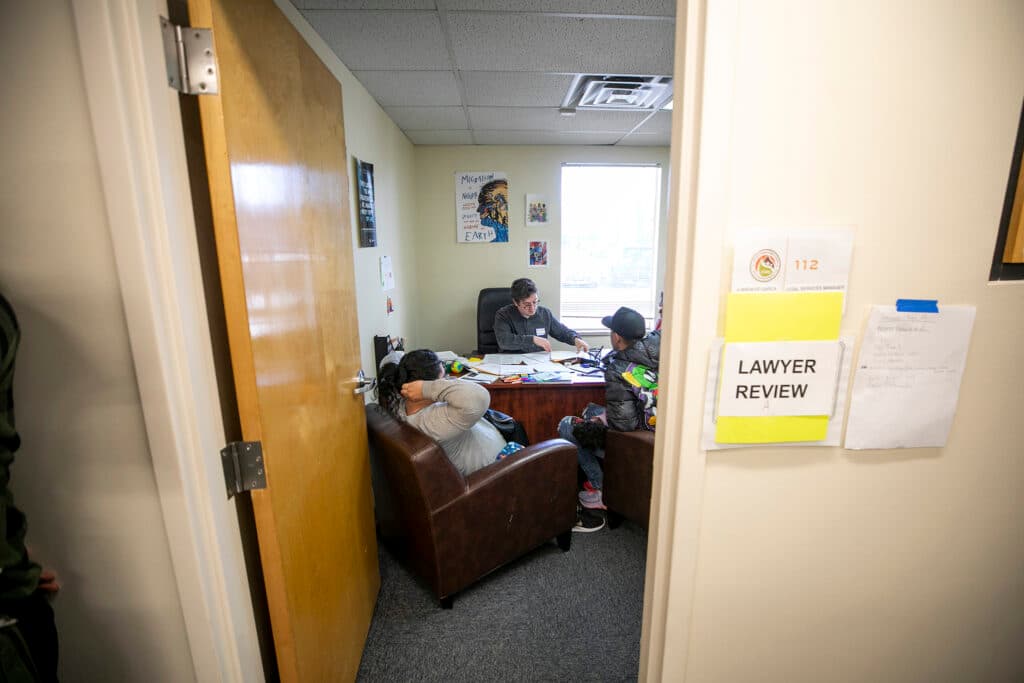
Lane-Arellano said her organization has already been helping a surge of families plan for potential deportations. Gladis Ibarra, the co-executive director of the immigrant rights organization, said a coalition of groups came together following Trump’s first successful campaign in 2016. Similar community organizing efforts are now underway to mount a second response, Ibarra said.
“Community has always been the root of our work, and I believe that community will see us through the next years as well,” Ibarra said.
Ibarra added Trump will have to contend with Colorado laws meant to protect newcomers. A law signed in 2019, for example, prohibits local law enforcement officers from arresting an individual solely based on their immigration status, and bars local law enforcement from providing personal information to federal immigration authorities.
But the relative level of concern among local immigrants may come down to how a new Trump administration defines “gang ties.”

Karelys Espinoza, who came to Colorado with her husband, two daughters and young son in 2022, said she was attentive to the news, aware of the animosity toward immigrants.
“It saddens my heart because we came from Venezuela fleeing a dictator and to think the United States will turn into another dictatorship thanks to Trump because of what he has said and his actions,” Espinoza said in Spanish. “We are in a stage where we do not know what will happen to us, we only trust in God.”
But while Epinoza said she supports Trump’s promise of deporting immigrants who have committed crimes, she worries about who exactly will fall under that category, like motorists who have gotten a traffic ticket.
“In reality, we are in a horrible uncertainty because we do not know what will happen to us,” said Espinoza, who feared Trump would attack all immigrants – with or without police run-ins.
She said she heard that Trump will respect the asylum process, but she’s unsure if he will keep his word to not disrupt it. She’s also worried he would take away their work permits.
“Small, petty brutalities”
Hans Meyer, a Denver immigration attorney said he was hopeful that state and local laws may help slow or prevent mass deportation.
Meyer noted that state and local officials aren’t allowed to collaborate with federal immigration officials in a number of ways—even if they want to.
“The biggest enemies to democracy were the collaborators, they were the local and state agents and local officials who collaborated and rounded up and detained people who were undesirable,” Meyer said. “They're going to try to enlist state and local elected officials or intimidate them, sheriffs and police, law enforcement officers and local prosecutors to do their bidding or to assist them in doing their bidding.”

Meyer said that while the local laws will be helpful to those living in Colorado, as opposed to Texas or Arizona, it won’t mitigate every problem started by federal immigration authorities.
“It'll be in sort of the small petty brutalities that are visited on people turning a blind eye to local law enforcement in jails or collaborating with ICE to try to hold people longer than they're allowed to be held,” he said. “Or it will be over policing of immigrants and communities of color over small quality of life crimes that end up functionally targeting huge immigrant or huge populations of immigrant communities.”
Aurora Mayor Mike Coffman declined to grant interviews on Wednesday, even though when Trump called his town a “war zone” he pushed back, along with the police chief and several civic leaders.
Aurora City Councilwoman Danielle Jurinsky, who has regularly criticized the influx of Venezuelan migrants into Aurora and questioned how many were part of a gang, did not return an email seeking comment Wednesday.

The city put out a statement pledging to follow federal law.
“The city and Aurora Police Department focus on enforcing state and local law,” read the statement. “As we always have, we will work with our federal partners and follow federal law and directives as they apply to our community.”
A potential clash between a 226-year-old law and modern court decisions
If Trump tries to invoke the 1798-era Alien Enemies Act, his promise to “round up” thousands of new arrivals and deport them will run into more currently-passed Fourth Amendment protections, which prohibit governments from unlawful search and seizure and requires probable cause to arrest someone.
As it currently sits, probable cause can’t be the color of someone’s skin, the job they’re working in or their last name.
“Having brown skin isn't probable cause. Speaking Spanish isn't probable cause. There's a lot of people who are people of color that are immigrants, and there's a lot of Spanish speaking people who are citizens,” Meyer said. “So that is a first constitutional and statutory bulwark against this whole mass deportation propaganda campaign. And that's really important to keep in mind because those are constitutional rights that apply to everybody.”

Laura Lichter, another Denver immigration attorney, wasn’t as sanguine on the Fourth Amendment, given the last Trump administration.
“The Supreme Court already told us he can do whatever the hell he wants, so all of these arguments about whether things are constitutional or not constitutional, I think almost go out the window and we're down to really, really practical kinds of things like, so you're going to round people up, what are you going to do?” Lichter said. “Are you going to open up some of those internment camps that we used to have in World War II? You going to put them in closed up Walmarts in places that we've abandoned? You going to do tent cities?”

Lichter said she would fight the disinformation campaign as vociferously as she’ll fight for her clients.
“This irrational desire to close the borders, but to only just certain types of people is viscerally offensive. It's foolish. It's economic suicide. It strips us of our ability to innovate. It's going to kill Social Security,” she said. “These people have lives, they have businesses, they own homes. They buy groceries, they pay taxes, they pay rent, they employ people, they help you remodel your house, they're teaching your kids, they're taking care of your kids. They're your business partner.”
Trust in America
Other newcomers are placing their faith in America’s rule of law, confident that if they follow the restrictions, they will get their day in immigration court.
Darcy, who is 17 years old and arrived in Colorado a few weeks ago after traveling for several months from Colombia with her family, said she and her family weren’t worried about Trump’s win. The family currently lives in one of the apartment complexes in Aurora that came under the national spotlight this summer for its ties to alleged Tren de Aragua gang members.
“We’re not worried because we have a court date for next year and in the meantime we can work on our legal paperwork,” she told CPR News in Spanish.
During the first Trump administration, immigrant rights groups set up a hotline so people can report any potentially illegal actions by Immigration and Customs Enforcement or other federal agencies.
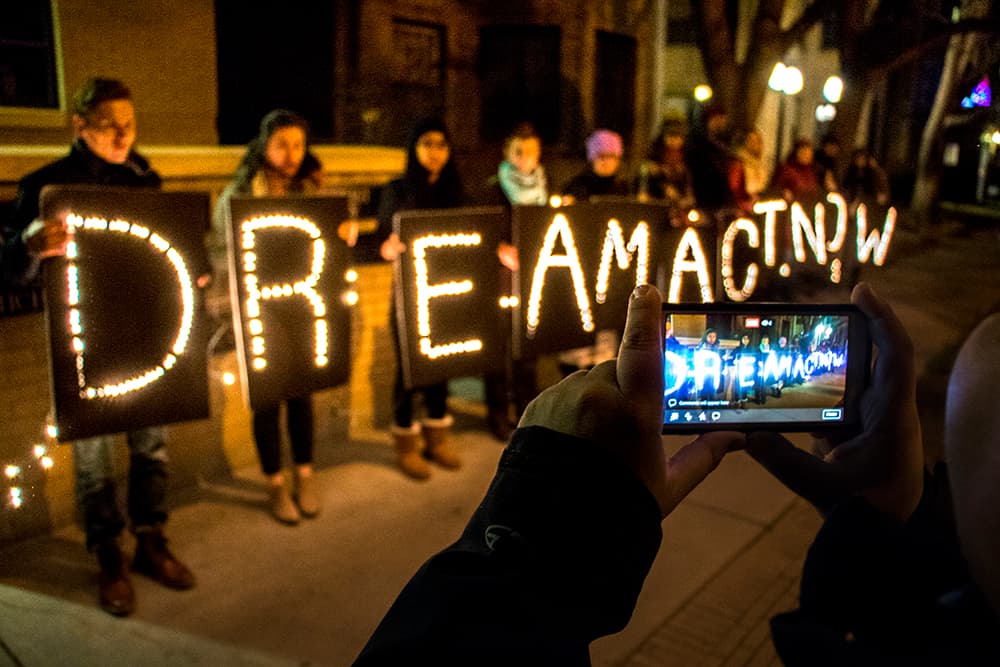
Jennifer Piper, a program director for the American Friends Service Committee in Denver, said the line has since turned into more of an information service for families concerned about potential deporations. The coalition of groups no longer staffs volunteers to respond to potential immigration raids or other actions.
While Piper thinks the hotline was an effective response to the first Trump Administration, she isn’t convinced the strategy makes sense for his return to the White House.
“This presidency won't look the same as the last time. There aren't the same guardrails that there were before. All of those have been weakened,” Piper said.
Piper expects more direct protest could serve as a more effective strategy, especially if it relies on alliances between immigrant rights groups, LGBTQ+ organizations, reproductive health advocates and public educators. Beyond demonstrating, she said people should be prepared to engage in other sorts of noncompliance like striking or refusing to pay taxes.

A viral video puts Aurora at ground zero
Trump has focused on Aurora since a video of men carrying guns at an apartment complex went viral earlier this year.
Since then, he repeatedly claimed Venezuelan gangs have taken over the suburb east of Denver. While around a dozen people with alleged ties to the Tren de Aragua gang have been arrested, local officials say the president-elect has overblown the situation for political gain.
Mekela Goehring, who runs the Rocky Mountain Immigrant Advocacy Network, a string of immigration lawyers and advocates, said she gathered her staff amid Wednesday’s snowstorm to grieve and gird for what’s to come.
“The Trump administration’s idea of using the Alien Enemies Act is a testament of how far they’re willing to go to look back at one of the most shameful parts of our history. We look back at that period of time as a grave violation of people’s civil rights,” Goehring said. “That’s one of the things that we as a community will stand strong against. We will not stand for the violation of civil rights for any of our community members.”
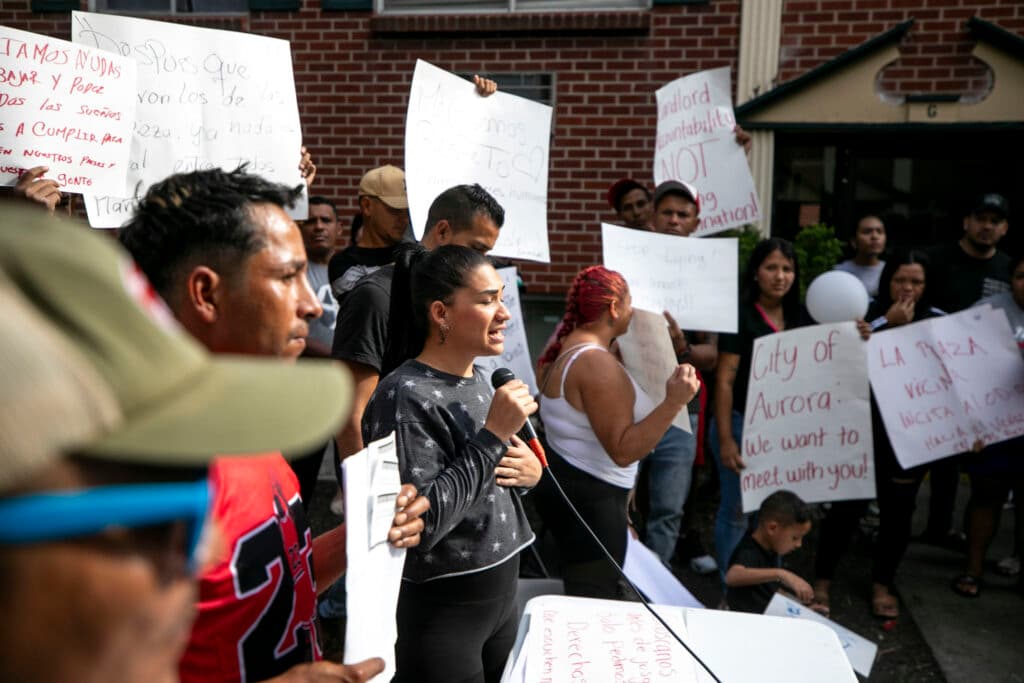
Meyer, who said he was still depleted from fighting on this front during the first Trump administration, agreed.
“I’m exhausted,” he said. “But if not now, when? And if not all of us, who?”
Amid all the uncertainty, Espinoza wanted to be sure Venezuelans aren’t all demonized. Those who have done harm in the community are in the minority and do not represent all Venezuelans even though their actions impact everyone.
“In reality it's a small fraction of people that don’t have a brain that I don’t know what they are thinking when they do bad things,” Espinoza said. “The majority of us came to give our children a better life and a better opportunity because us adults can bear hunger, we can bear the cold, we can bear all of the storms that may come but the children are not to blame and in our case, the greatest satisfaction of my husband and I — after going through so many things to get to the United States - is to give my children a good education and the opportunity to eat three meals a day and live a good life. It’s a blessing for us.”

